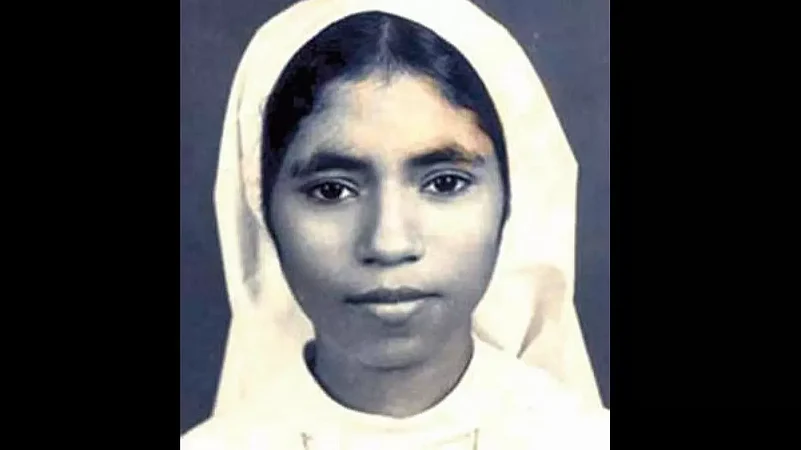The Delhi High Court ruled on Tuesday that conducting a "virginity test" on a female accused is unconstitutional, sexist and in violation of her right to dignity, calling it a form of inhuman treatment.
The court also observed that there is no legal procedure that provides for a "virginity test".
The order was passed by Justice Swarana Kanta Sharma on a plea moved by Sister Sephy, who sought to declare the conduct of a "virginity test" on her in connection with a criminal case over Sister Abhaya's death in Kerala in 1992 as unconstitutional.
The petitioner had alleged before the high court that she was forcibly subjected to a "virginity test" in 2008 by the Central Bureau of Investigation (CBI) under the pretext of the agency's investigation to substantiate its case and the results were leaked.
The petitioner's plea was opposed by the CBI, which argued that it was well within its right to get her medical examination conducted and the test was necessary for the investigation of the murder case.
What did the court say?
"It is declared that the virginity test conducted on a female detainee, accused under investigation or in custody, whether judicial or police, is unconstitutional and in violation of Article 21 of the Constitution, which includes the right to dignity," Justice Sharma said.
"This court, therefore, holds that this test is sexist and in violation of the human right to dignity even of a female accused if she is subjected to such a test while being in custody," the judge said.
The court asserted that conducting the "two-finger test" or "virginity test" on female sexual assault victims has already been held by the Supreme Court to be violative of their right to dignity, integrity and privacy, and there "cannot be two sets of views" on the issue.
The court emphasised that the concept of "custodial dignity" of a female includes her right to live with dignity even while in police custody and conducting a virginity test on her not only amounts to an investigating agency's interference with her bodily integrity, but also with her psychological integrity.
"Strangely, though the word 'virginity' may not have a definite scientific and medical definition, it has become a mark of purity of a woman. The intrusive testing procedure, as has been held in several judgments of the Hon'ble apex court, does not have a medical standing," the court observed.
"It will be difficult for this court to hold, being guided by the constitutional principles of fundamental rights, that a person in custody of authorities surrenders the right to bodily integrity and submits to bodily intrusion for the prosecution to find evidence through his body.
"The feeling of being demeaned by such treatment in custody by bodily invasion through conducting a virginity test also brings forth the undesirable and abhorrent notion of differentiation on the basis of gender and stereotypes," it said.
The court said while it was not examining whether the test was necessary for the investigation, conducting it on the accused on the pretext of unearthing the truth amounted to an infringement of her right as enshrined in Article 21.
"Conducting a virginity test on the pretext of reaching the truth regarding the allegations against her will amount to infringement and violation of her right enshrined in Article 21," the court said.
"Further, without an iota of doubt, the same rests on gender bias and the society's view and obsession with the false concept of virginity being equated with the purity of a woman. Needless to say, it also amounts to controlling women's body, their sexual behaviour and the view that a woman with the hymen is pure and innocent," it added.
The court also said the right to dignity is not suspended even when a person is accused of committing an offence or arrested and the right to life and personal liberty can be suspended only in accordance with the procedure established by law, which must be just, fair and reasonable and not arbitrary, fanciful and oppressive.
"Most shockingly, in the present case, the virginity test was used to determine the truth of the accusation of murder against the petitioner. Undoubtedly, the test in itself is extremely traumatic for a victim of sexual assault as well as upon any other women in custody," it said.
"The right to personal liberty of an accused gets suspended the moment one is arrested as the same might be necessary for State security. However, the right to dignity is not suspended or waived even of an accused, undertrial or a convict," the court said.
At the same time, the judge clarified that the right to dignity in custody does not refer to the ordinary stresses and anxieties that a person may feel as a result of being in custody and under interrogation.
It also said the issue of compensation to the petitioner shall be considered by the National Human Rights Commission (NHRC) in accordance with the law in this regard and that legal remedies for defamation due to the alleged leak of the test report to the media by the CBI are available to her.
As far as the petitioner's plea for action against the CBI was concerned, the court observed that when the test was conducted, there was no declaration on it being unconstitutional, howsoever despicable or deplorable the practice might have been.
All about Sister Abhaya's death
In March, 1992, Sister Abhaya was found dead in a well filled with water in the St Pius X Convent in Kottayam, Kerala.
The initial police investigation pointed towards a theory of suicide associated with psychological illness. Owing to the pressure from the local community, the investigation was later handed over to the CBI in 1993.
The first CBI team which probed the case did not come up with any conclusion on the cause of death. A second CBI team was then brought in, which said it was murder, but there was a lack of evidence to nab the culprits. The court refused to accept this report and asked for the investigation to continue.
In 2005, the CBI filed another closure report before the court, which was rejected as well. By 2008, the CBI had approached the court to close the case four times, when the High Court handed over the investigation to the state unit of the CBI. The new CBI team in 2008 arrested two Fathers and Sister Sephy from the Convent and charged them with the murder of Sister Abhaya.
In December 2020, 28 years after Sister Abhaya’s body was found, Father Thomas Kottoor and Sister Sephy were found guilty of murder and given life sentences.
(With PTI Inputs)


























